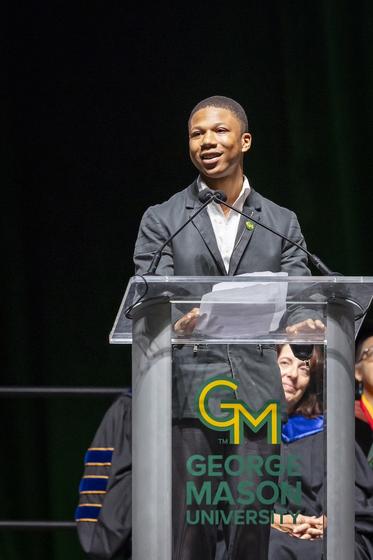George Mason University welcomed the largest incoming class in university history at New Student Convocation on Friday, with administrative, faculty and student speakers encouraging the newcomers to take full advantage of their academic and social opportunities, including robust campus involvement.

“Students like you come to George Mason to receive a world-class education, graduate with little or no debt, and land a fantastic job on the back end,” President Gregory Washington told the enthusiastic throng at EagleBank Arena. “That is the reason why George Mason is No. 1 in the state…for upward mobility. It does not matter where your Point A is. We get you to a spectacular Point B.”
Washington reminded students that they now attend the largest and most diverse public university in Virginia, a top-tier research institution that has leapt 110 spots in the Wall Street Journal rankings since 2020 and is one of only two universities in the nation to be both top 20 in free speech and a five-star Campus Pride Index university.
“We don’t just look different,” Washington said. “We think different. We act different. And you know what? We figure out a way to make it all work together, and we do that better than anyone else in the country.”

Washington advised students to use PatriotAI as a strategic tool and not a shortcut, and to find ways to get involved with the Grand Challenge Initiative by studying the six areas of focus and working alongside faculty members who are tackling these issues.
Keith Renshaw, senior associate provost for undergraduate education, told the incoming students that the communication, problem-solving and other skills they learn will enable them to adapt and switch jobs and careers—including occupations that do not yet exist.
“It’s not your major that’s going to dictate where you will or will not go,” Renshaw said. “It’s what you do with your major, and what you do with the opportunities you can take advantage of here. At George Mason, we don’t want you to just gain knowledge. We want you to use knowledge.”
Keynote speaker Randy Lioz, founder and consultant for Depolarizing Organizational Cultures, encouraged students to move beyond the isolation of a “phone-based life” to engage with others, particularly fellow students of different backgrounds, to promote greater understanding and spur new connections.
“The research is unmistakable,” said Lioz, who is pursuing a master’s degree in conflict analysis and resolution at the university. “The more we avoid each other, the more we misunderstand each other. That avoidance is taking a very personal toll, especially on our relationships. What I want you to realize about being at a place like George Mason is it’s about the people who surround you and the opportunities they bring to broaden your view of the world.”
Undergraduate student body president Isaiah Grays echoed that theme. Grays recalled coming to the university last year as an out-of-state freshman full of uncertainty about what life might be like in his new environment. All students, he said, should realize they have at least one thing in common—George Mason as a “shared destination.”
“Many of you may feel a sense of apprehension from the unknown,” Grays said. “But your college experience is shaped by your willingness to branch beyond what you are familiar with.”
Students learned about the many physical and mental health resources available to them, as well as the university’s more than 500 registered student organizations, from Vice President for University Life Rose Pascarell.
“You are going to thrive here, and we’re going to do everything we can to support you in that,” she said.
They also got a crash course from Doc Nix and the Green Machine on learning the university fight song,
“You’re in a family now,” Washington said. “We affectionately call it ‘the Mason Nation.’ And you’re a big part of that.”
